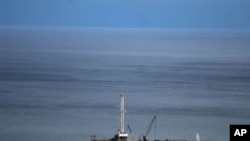While more and more countries join the African club of oil-producing nations, U.S.-based researchers are trying to help them avoid what they call the oil curse. The saying refers to countries suffering from increased violence, poverty, authoritarianism, pollution and corruption along with their oil riches.
A recent paper by the Washington-based Center for Global Development is called "Oil for Uganda or Ugandans?" The subtitle is "Can Cash Transfers Prevent the Resource Curse?"
The idea that is being proposed is for Uganda's government to distribute future oil revenue through direct cash transfers to Ugandans, money which would then be taxed.
Oil revenue accountability
The authors of the report say they believe this would make government spending more accountable, and less prone to corruption and deteriorating governance. They also are proposing directing oil revenues toward an education fund for Uganda's youth.
One of the authors is former World Bank official Alan Gelb.
"I think that the paper has the potential to stir debate in Uganda, first of all on the question of accountability. How should Uganda, or Ugandans, what should they expect from government as the government starts to use this money?" asked Gelb. "After all, in most countries oil revenue is the property of the nation or the people of the nation, and the government is using it on their behalf."
So far, Ugandan government officials have pointed in another direction, which is to spend oil revenue on infrastructure projects, an area which Gelb says is particularly prone to corruption and political entrenchment and patronage.
Follow the dollar
Whatever options are eventually chosen, Gelb is calling on Ugandan journalists, civil society activists and lawmakers to sharpen their understanding of oil related transactions so they can track money and apply informed pressure.
"Look for key points where one can ask, demand and expect transparency and open information. One is on the total receipts from the oil industry. Secondly, one would like a very clear picture on how these are being used and what the results have been, how contracts have been tendered, those kinds of things," he said.
Uganda's government is now saying the country may hold deposits of up to 6 billion barrels of oil, with production expected to begin next year from the Lake Albert Basin.
Another U.S.-based researcher, Ian Gary, recently went to Uganda to share lessons learned from new oil producer Ghana, which he has been studying closely as part of his work with the group Oxfam America.
Gary has been advocating for an open exploration licensing process. Licenses are paid for by companies before they are allowed to begin exploration.
"There have been a lot of issues coming up in Ghana about whether politicians may be behind some of the small and little-known companies that appear on some of these oil licenses," said Gary.
Environmental, budgetary best practices
Another disappointment for Gary came when Ghana recently allocated about $300 million in excess revenues from oil production into the current budget rather than directing the money to newly established savings and stabilization funds. The funds are meant to finance development projects, as well as protect Ghanaians from the volatility of oil prices.
"What we are seeing right now is a little bit of lack of discipline on the part of the government and early deviation from the law, so that is a concern on our part, that early on, the government is deviating from the terms of the law," said Gary. "Obviously the budget was prepared before the revenue management act was put in place, but it is concerning that in this transition period the government has not followed the letter of the law."
Ghana started exporting oil this year, less than four years after a major offshore discovery was made. Gary says legal and oversight frameworks have not been able to keep pace with the new challenges Ghana faces, including establishing better environmental protections.
With neighboring countries Ivory Coast, Liberia and Sierra Leone also poised to increase oil exploration in their waters, Gary says there is no shortage of lessons to be learned on best practices to avoid the so-called oil curse.




